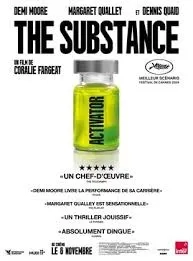The Substance – "Pretty Girls Should Always Smile"
Elisabeth, a fading actress who has transitioned into a new career, is fired for being deemed too old to host a fitness show. She receives an offer to try a mysterious substance, which promises to transform her into "the best version" of herself.
The opening scene juxtaposes the triviality of a destitute man and a greasy burger with a symbol of fame: the iconic Hollywood star. This film is a scathing critique of ageism, the obsession with beauty on television, and by extension, in cinema. It highlights the pressure on actresses to conform to male fantasies. The substance serves as a powerful metaphor for cosmetic surgery. Those who use it—who would want an aerobics host with sagging features?—struggle to quit despite its temporary effects, leading to aesthetic alienation and grotesque facial parodies. The fitness show itself feels more like soft pornography, pushing the limits of sexualization.
For those seeking pure horror, the film delivers a gore-filled final act. The clever casting of a once-popular actress in the lead role adds a meta layer. The direction is outstanding, even managing to turn the act of shrimp-eating into a spectacle. This is a film that deserves close analysis of every sequence.

Alien: Romulus – "Did You Hear About the Claustrophobic Astronaut? He Needed Space"
A team of miners discovers the wreckage of the spaceship from the first film, along with the hideous creature aboard.
If this were the first film to feature the infamous alien, it would be hailed as a masterpiece. However, coming after an already exhaustive heptalogy, the once-terrifying monster has lost its edge. The narrative adds nothing new to the franchise. It’s a shame because the opening, set in a dystopian world, showed promise. Like its predecessor, it suffers from thematic emptiness but lacks the originality that once made it compelling. The portrayal of the android, though, is impressively human. Ultimately, this is a lackluster iteration of familiar franchise tropes.

Juré n°2 – "Truth Is Not Always Justice"
Justin is selected to serve as a juror, but the situation becomes complicated when he realizes he may be personally involved in the case.
Clint Eastwood delivers a courtroom drama with a complex narrative, drawing clear parallels to 12 Angry Men. The film methodically dissects the flaws within American society. The focus is not on who committed the murder, but on how Justin navigates his moral dilemma. The film critiques the justice system, exposing how personal biases and persuasive lawyers can influence verdicts. Themes like doubt and deceptive appearances abound.
SPOILER ALERT:
The brutish man, who appears guilty, is ultimately innocent, while the seemingly ideal son-in-law escapes suspicion almost entirely. The illusion of the perfect family is gradually shattered. The ending is beautifully open-ended. Far from signaling the swan song of the nonagenarian director, the film bursts with vitality, proving that Eastwood is far from past his prime.




Comments (0)